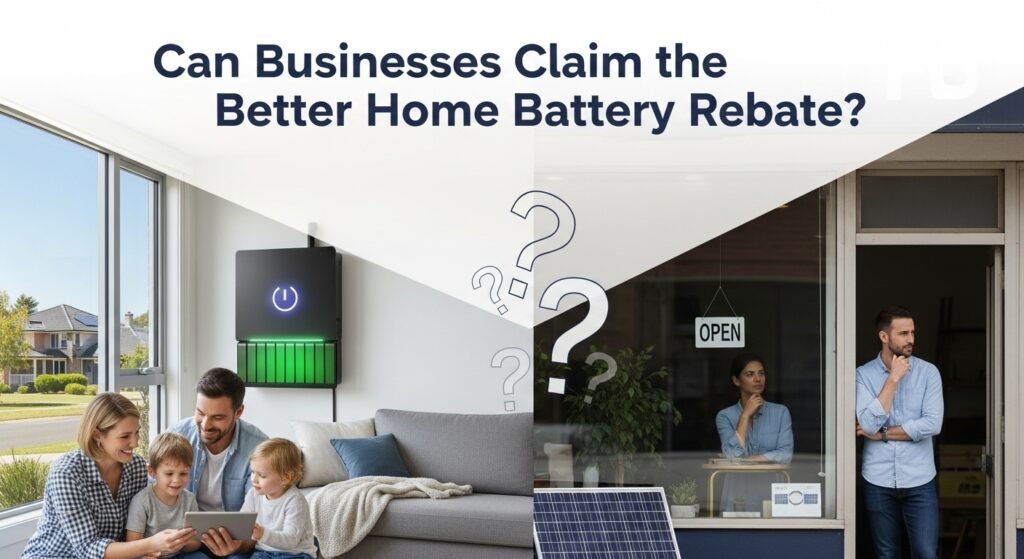
Power Up Your Profits: How Australian Businesses Can Seize the Better Home Battery Rebate
Australia is at the forefront of renewable energy adoption, and the government’s commitment to a sustainable future continues to open exciting opportunities for businesses. One such initiative is the Better Home Battery Scheme, a program designed to accelerate the uptake of battery storage systems. While the name suggests a residential focus, there are significant indirect benefits and strategic plays for businesses to leverage this scheme and supercharge their energy independence.
In this detailed guide, we’ll break down the Better Home Battery Scheme, explore its nuances, and reveal how savvy Australian businesses can strategically utilise the rebate to their advantage, reduce operational costs, and contribute to a greener grid.
What is the Better Home Battery Scheme?
The Better Home Battery Scheme is a state-based initiative (currently prominent in Victoria, for example) that provides rebates for eligible households to install a home battery storage system. The core goal is to help Victorians reduce their energy bills, increase their energy independence, and support the state’s renewable energy targets.
Key Features (Victorian Example):
- Rebate Value: The rebate amount can vary, but it significantly reduces the upfront cost of a battery system.
- Eligibility Criteria: Primarily focused on owner-occupiers of existing homes, with certain income thresholds and property value limits.
- Approved Products & Installers: Batteries and installers must be approved under the scheme to ensure quality and safety.
- Solar PV Requirement: Often requires the property to have existing or newly installed solar PV panels.
Why is this important for businesses if it’s “home” focused?
This is where the strategic thinking comes in! While businesses can’t directly claim the “Better Home Battery” rebate for their commercial premises, the scheme creates a ripple effect that businesses can absolutely capitalize on.
Indirect Benefits and Strategic Plays for Australian Businesses
Here’s how businesses can indirectly benefit from and strategically engage with the Better Home Battery Scheme:
1. Increased Demand for Battery & Solar Installation Services:
- Opportunity for Installers & Electricians: If your business is in the solar PV, battery storage, or electrical installation sector, this is a direct boom! The scheme drives demand, leading to more quotes, more installations, and more revenue. Ensure your business is accredited and listed as an approved installer under relevant state schemes.
- Training & Workforce Development: With increased demand comes the need for a skilled workforce. Businesses can invest in training their staff in battery installation and maintenance, creating a competitive edge.
2. Wholesale & Retail of Battery Storage Systems:
- Suppliers & Distributors: Businesses that wholesale or retail battery storage systems (e.g., Tesla Powerwall, Sonnen, LG Chem, BYD) will see a significant uplift in sales volume. The rebate makes these products more affordable for consumers, expanding the market.
- Strategic Stocking: Understanding the scheme’s popularity and specific approved products allows businesses to strategically stock inventory, ensuring they can meet demand.
3. Energy Management & Consulting Services:
- Advisory Roles: As more homes adopt solar and batteries, the energy landscape becomes more complex. Businesses can offer consulting services to homeowners (and eventually, other businesses) on optimising their energy usage, understanding their battery performance, and navigating energy tariffs.
- Software Solutions: Development or deployment of software platforms that help households (and small businesses) monitor, manage, and optimise their solar and battery systems can be a lucrative venture.
4. Showcasing & Education – Driving Commercial Adoption:
- Demonstration Effect: As more homes install batteries, the technology becomes more visible, understood, and trusted. This naturally flows into increased curiosity and demand from commercial enterprises. Businesses can set up demonstration sites or case studies to showcase the benefits of battery storage, leveraging the public’s growing familiarity.
- Bridging to Commercial Rebates: While the “Home” scheme is separate, it often paves the way for similar commercial incentives. Businesses should stay abreast of any emerging state or federal rebates for commercial battery installations, as the success of home schemes can influence broader policy.
5. Real Estate & Property Development:
- Value Proposition: For developers building new homes or renovating existing ones, integrating solar and battery solutions (eligible for the rebate) can be a major selling point, increasing property value and attractiveness.
- Future-Proofing: Installing these systems makes properties more resilient to energy price fluctuations and grid outages, a significant draw for environmentally conscious buyers.
6. Financial Services & Green Loans:
- Specialised Financing: Banks and financial institutions can offer specific loan products tailored to cover the remaining cost of battery systems after the rebate, making it even more accessible for households.
- ESG Investment: Businesses focused on Environmental, Social, and Governance (ESG) criteria can see this as an opportunity to support sustainable initiatives through investment or partnership.
Actionable Steps for Businesses
To effectively utilise the Better Home Battery Scheme’s halo effect, consider these actions:
- Stay Informed: Regularly check the official websites of relevant state government energy departments (e.g., Solar Victoria) for the latest scheme details, eligibility criteria, and approved product lists.
- Become an Approved Provider: If you’re an installer or supplier, go through the necessary accreditation processes to become an approved participant in the scheme. This is crucial for direct engagement.
- Market Strategically: Tailor your marketing efforts to highlight how your products or services align with the scheme’s goals. Educate potential customers on how they can access the rebate and how your offering complements it.
- Form Partnerships: Collaborate with other businesses in the renewable energy ecosystem – solar installers partnering with battery suppliers, or financial institutions partnering with installation companies.
- Innovate: Look for gaps in the market that emerge due to increased battery adoption – perhaps smart energy management systems, maintenance plans, or recycling solutions for end-of-life batteries.
- Advocate: Engage with industry bodies and government consultations to advocate for broader commercial battery storage incentives, using the success of home schemes as a case study.
The Future is Charged
The Better Home Battery Scheme is more than just a residential rebate; it’s a catalyst for the broader adoption of battery storage technology across Australia. By understanding its mechanisms and ripple effects, Australian businesses have a unique opportunity to innovate, grow, and contribute to a more sustainable and energy-independent future. Don’t just watch the energy revolution unfold – power up your business and be a part of it!
Official Government Resources
These websites are the primary sources of information for the federal and state government battery programs.
- Cheaper Home Batteries Program – energy.gov.au: The main portal from the Australian Government detailing the national rebate scheme available to households and small businesses.
- Clean Energy Regulator (CER) – Cheaper Home Batteries Program: As the body administering the program, the CER website offers in-depth information on eligibility, compliance, and the process of creating Small-scale Technology Certificates (STCs) for batteries.
- Department of Climate Change, Energy, the Environment and Water (DCCEEW) – Eligibility Information: This page provides specific eligibility criteria for consumers, businesses, and products under the Cheaper Home Batteries Program.
- Solar Victoria: The official resource for Victorian government solar and battery initiatives. While the “Solar for Business” rebate has closed, the site provides information on other state-based energy programs and directs users to the current federal scheme.
- Energy NSW – Install a battery: Provides details on incentives in New South Wales, including the Virtual Power Plant (VPP) incentive that can be combined with the federal rebate.
Reputable Industry & News Sources
These industry websites provide detailed analysis, consumer guides, and business case studies related to the battery rebates.
- SolarQuotes – Federal Government Battery Rebate Guide: An extensive guide explaining how the national battery rebate works for both homeowners and small businesses.
- SolarChoice – Federal Government Solar Battery Rebate Explained: This resource breaks down the rebate value, savings calculations, and eligibility requirements for various battery brands.
- Smart Commercial Solar – Australia’s First Battery Rebate for Businesses Unpacked: An article that specifically analyses the financial implications and return on investment for businesses considering a battery system under the federal scheme.
